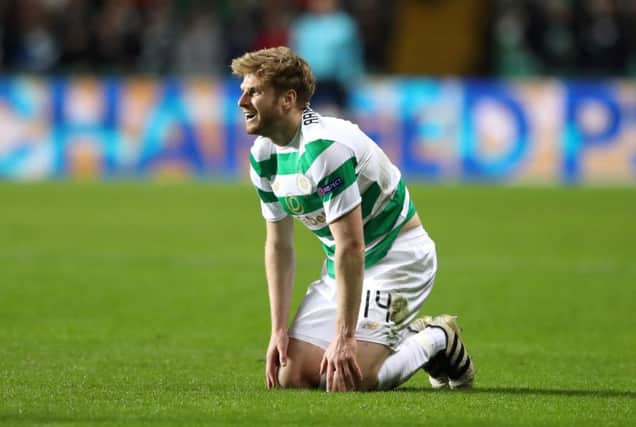Five things we learned from Celtic 0 - 1 Anderlecht


Anderlecht were both familiar and unrecognisable
We knew the Belgians were going to be an improved side since the last time they faced Celtic. Having won seven of nine league fixtures, they were no longer the floundering mid-table side walked all over by Brendan Rodgers’ men in the first game. Still, few in Parkhead were prepared for quite how different they would be.
It was a similar set-up, with a front three of Henry Onyekuru on the left, Pieter Gerkens on the right, and Sofiane Hanni as a false 9, but the system’s effectiveness had suddenly been turned up to 11. Onyekuru caused all sorts of problems down the left, being heavily involved in three dangerous attacks in the opening eight minutes, which was more than he’d contributed in the entirety of his 90 minutes in the first game.
Advertisement
Hide AdAdvertisement
Hide AdThe visitors moved seamlessly between a 4-3-3 with possession and a 4-4-2 diamond without it. Pockets of space became available all over the Celtic half, enabling them to pass in a similar manner to their opponents in Brussels, while an effective pressing system forced the home side into punting it long time and again.
With Moussa Dembele far from at his best, it meant the ball kept coming back and Celtic were facing wave after wave of attack.
Anderlecht lacked the quality to truly punish Celtic
In the opening half alone, the Scottish champions made more basic errors than they did in either of the thumpings by PSG. However, the sides went into the half goalless, and indeed Anderlecht wouldn’t even manage to put the ball in the back of the net without a Celtic player doing it for them.
For all the threatening they did in the opening half, they didn’t create as many clear-cut opportunities as they should have done. There was the Sven Kums chance at the beginning, which he should have buried, and a terrific flowing move that ended with Gerkens flicking a Dennis Appiah cross into the path of Adrien Trebel to test Gordon. But that was about it.
Too often they would fail to find a man with the cross, or overhit an intended through ball. An uncharacteristically sloppy display from Rodgers’ side went unpunished.
Rodgers made a key intervention
While Anderlecht were a little powderpuff when it came to the killer blow, it must be said that Rodgers played a key role in helping to minimise the threat from the Belgians. It was one-way traffic until the Parkhead boss made an alteration to his side’s formation around the half-hour mark. It didn’t turn a bad performance into a great one, but it enabled Celtic to begin giving as good as they got.
It seemed like a bit of a risk to begin with. Anderlecht were getting a lot of joy down the flanks, so going to a 5-3-2 system with James Forrest and Kieran Tierney operating as wing-backs might have played right into that. Instead, it largely diminished the number of promising attacks which came from those areas. (The goal came from Anderlecht’s right, but that was largely down to a poor clearance from Tierney who then failed to get out quickly enough to close down Dennis Appiah.)
At half-time Rodgers doubled down on his new formation, withdrawing the ineffective Scott Sinclair and downright terrible Stuart Armstrong for Olivier Ntcham and Tom Rogic. It improved Celtic further and, aside from the goal, which gave them a brief scare, they were arguably the better side in the second period. They weren’t better by much, if at all, but then they didn’t need to be. The away side were running out of steam and the last 10 minutes were played out without incident.
Scott Brown is absolutely vital
Advertisement
Hide AdAdvertisement
Hide AdAnother aspect of Celtic’s play which enabled their improvement was that of Scott Brown. The captain was largely anonymous for the opening 30 minutes as the Belgian visitors shut off the passing lanes to the influential midfielder, forcing Celtic to go long. However, once Rodgers was able to grant his skipper some space in front of the defence, things started go to that little bit more smoothly for the home side.
It demonstrated once again, if we needed further proof, that for Rodgers’ passing philosophy to work to its capacity, Brown has to be allowed to pull the strings from his role at the base of the midfield. After the quiet start he grew into the game exponentially as time ticked by, and finished the 90 minutes as his side’s best player.
Question marks remain over a number of players
Brendan Rodgers is reportedly looking to the January transfer window to improve his squad. He doesn’t want to wait until next summer to do the majority of his shopping and have a team in flux when the 2018/19 Champions League qualifiers roll around, especially with the issue of the World Cup and a number of first-team stars unavailable due to international commitments.
It will also give him the chance to improve the team before they embark on their Europa League adventure. Before Tuesday night’s game, he would have felt confident that this current group of players could take Celtic deep into the second tier competition. That may no longer be the case.
Sinclair and Armstrong continued their poor form across the group stage campaign, while Dedryck Boyata had a shocker at the back. Then there were the so-so performances from Moussa Dembele, Callum McGregor and just about everyone else bar Brown in the squad. Very few should feel confident they’ll definitely start the next time Celtic line-up for a European match.
